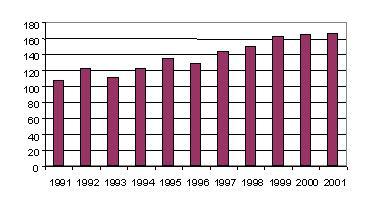1.3 Vocation and competencies Reviews carried out in connection with the establishment of the European Research Area and the publication of STAR21 have shown that there are a number of generic problems in Europe affecting scientific disciplines, including the fact that fewer students are coming through. Given the very long lifecycle of space projects and their specific features, the sector is particularly sensitive to the continued transfer of know-how and information between generations of scientists and engineers. However, the population of space specialists is ageing.
Notwithstanding productivity gains in space industry (cf. Figure 6), Europe must invest in human resources and know-how. For the space sector, the need to attract young scientists and the mobility of scientists and engineers are particularly acute problems. Europe must increase the number of researchers in this field, e.g. by making better use of the female scientific potential, by recruiting researchers and engineers from third countries, by making it easier for expatriate European scientists to return (in particular by preventing a "brain drain") and by setting up attractive programmes offering incentives to young scientists.
Q6: What action should be taken in space professions and associated field to make them more attractive, in particular to young people?
|
|
NEWSLETTER
|
| Join the GlobalSecurity.org mailing list |
|
|
|


